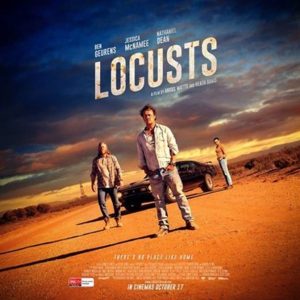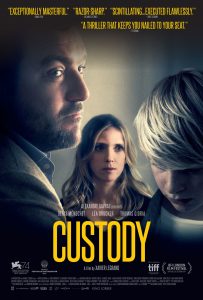If there’s one thing the Australian film industry is great at, it’s turning our gaze inwards to this country’s dirty underbelly. Australia loves stories about criminals and the fringe. A key part of this nation’s identity, the struggle between law and order, civilisation and chaos, has been around for as long as there’s been people on this continent. It’s a theme that we seem more than happy to explore on the cinematic screen and Locusts, from Heath Davis and Angus Watts, is the latest in this long and fruitful tradition.
Ryan (Ben Geurens) is a big city boy with a prescription drug problem and an expensive car. His business is booming, in some circles he’s considered ’The New Mark Zuckerberg’, and with a wife and son it seems his life is on track. Yet his dark past never seems far away. Growing up in one of the mining towns in western NSW has left a mark.
When his father suicides – “twenty years too late” bemoans his brother Ty (Nathaniel Dean) – he returns to his home town, a squalid frontier settlement where the once prosperous mines have dried up. It’s a ghost town now. The poverty cycle has engulfed the whole region and there’s little to do apart from drink and start bar fights. This unforgiving land breeds unforgiving people. As more of his family’s dark secrets rise up from the sunbaked ground, past debts and new threats reemerge.
 Local award winning screenwriter Angus Watts has created a fantastic piece of genre filmmaking. This project has been percolating for over five years and with director Heath Davis (Book Week) at the helm it’s come together beautifully. The same vein of desolate madness that films like Wake in Fight and Mad Max tapped into is mined here too – Mad Max especially since Locusts was also filmed around Broken Hill during a drought.
Local award winning screenwriter Angus Watts has created a fantastic piece of genre filmmaking. This project has been percolating for over five years and with director Heath Davis (Book Week) at the helm it’s come together beautifully. The same vein of desolate madness that films like Wake in Fight and Mad Max tapped into is mined here too – Mad Max especially since Locusts was also filmed around Broken Hill during a drought.
The sense of place has been captured beautifully. Those living in Australian cities can scarcely imagine what it is to live in the boom-and-bust culture of mining towns. This part of the world doesn’t seem to want life living on it and, with the tyranny of distance, when local industry dries up these places become financial prisons where isolation is the bars.
We’re seen this story plenty of times before but Watts’ script is a tightly written beast that unfolds slowly, revealing the many layers underneath. Chris Bland’s cinematography is nothing like his name suggests, there’s a true beauty in Australia’s desolation and he’s captured it beautifully. Some scenes around sunset are absolutely gorgeous. The closing image is perfect.
Apart from one out of place piece of literal toilet humour and some poor prop design – whoever made the fake money seemed to think John Monash was on the $50 note, an odd but funny gaff – this is a great local feature that pulls not punches. I’m not familiar with Watts and Davis’s other work but I’ll be sure to check them out now. It takes a little while to find its feet but Locusts grows into a perfectly tuned piece of local crime drama.
Locusts is in cinemas from 17th October.





